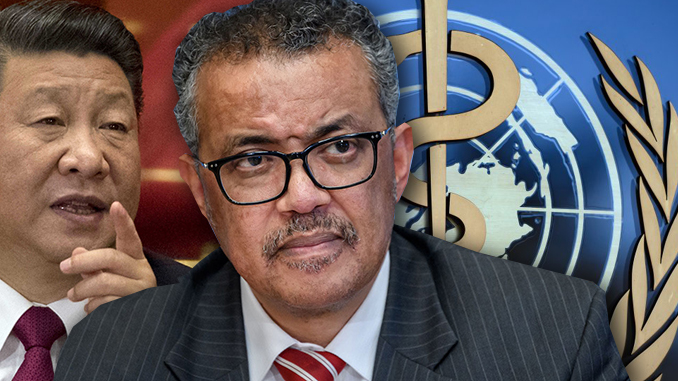
By Mark Anderson
What one might call “double trouble” is on the horizon. First, there is the unsettling “One Health” worldview being pushed by the world’s medical establishment, including the prestigious UK-based health journal The Lancet, whose roots tie into the founding of Britain’s esteemed National Health Service. The rigidly monopolistic “One Health” ethos is being hardwired into the World Pandemic Treaty now under construction by the World Health Organization in Geneva.
The advancement of “One Health” on a worldwide scale, combined with this treaty—the first draft of which recently emerged—could constitute one of the greatest attacks on human liberty of all time.
The One Health concept, simply put, is defined by The Lancet as “an integrated unifying approach that aims to sustainably balance and optimize the health of people, animals and ecosystems.”
The medical journal notes that the concept “recognizes the health of humans, domestic and wild animals, plants and the wider environment (including ecosystems) as closely linked and interdependent.”
That may sound sensible. Nobody wants environmental degradation and, clearly, the health of non-human life has some bearing on human well-being. Yet, One Health’s engineers go on to say:
One Health places us in an interconnected and interdependent relationship with non-human animals and the environment. The consequences of this thinking entail a subtle but quite revolutionary shift of perspective: All life is equal—and of equal concern.
OF EQUAL CONCERN?
This is where it becomes clear that humanity, far from being seen as the crown of God’s creation, is being afforded no special place in the world whatsoever. Taken to its logical conclusion, establishing that all life on earth is “of equal concern” would easily create the rationale for especially stringent lockdowns and other ultra-tyrannical measures should another serious “pandemic” come along.
Thus, according to One Health, humanity is hardly more than livestock, and if history is any teacher, we’d be treated accordingly.
SCIENCE OR “SCIENTISM”?
Consider the 2004 book The Ascendancy of the Scientific Dictatorship, by Phillip and Paul Collins. The authors wrote of the growing technocracy’s “fanatically religious adherence to the doctrine of scientism,” adding that: “The doctrine of scientism rigorously promotes the ecumenical imposition of physical science upon all fields of inquiry.”
Modern science’s dark underbelly is a virtual religion unto itself, where there is no separation of “religion” and state. That book’s authors add: “Indeed, the technocracy’s doctrine of ‘scientific’ determinism has selectively excluded any data that challenges the ultimate agenda: Complete social control.”
The data being excluded includes, of course, the Covid-19 jab data gathered via the UK’s Yellow Card system and its U.S. counterpart, the Vaccine Adverse Event Reporting System, or VAERS. This data is compiled by the governments themselves and show a plethora of serious adverse reactions and apparent deaths stemming from the various Covid-19 vaccines, which deserve a deeper study.
Yet none of it has been considered serious enough to suspend all Covid-19 jabs and boosters precisely until such a thorough review is completed.
PANDEMIC TREATY
Dated Feb. 1, 2023, the initial “Zero Draft” of the World Pandemic Treaty has emerged. The Intergovernmental Negotiating Body, or INB, which is said to represent the WHO’s 194 member states, is the official panel tasked with building this treaty. The 32-page treaty, so far, has 8 chapters, a 49-point Preamble and 38 Articles. The U.S. Constitution, by comparison, has 7 Articles. The first round of talks since the Zero Draft’s release (what will be the INB’s fourth round overall) were set for Feb. 27 as AFP goes to press. By all indications, a series of talks will follow.
The initial draft indeed incorporates the One Health concept. Plank 26 of the Preamble states in part that the globalist organization seeks to reaffirm “the importance of a One Health approach and the need for synergies between multispectral and cross-sectoral collaboration at national, regional and international levels to safeguard human health.”
Also, this treaty draft coyly employs the Orwellian technique of “inherent contradiction.” The Preamble’s first two planks are a good example of this.
While plank 1 reaffirms the “principle of sovereignty of states parties in addressing public health matters, notably pandemic prevention, preparedness, response and health systems recovery,” plank 2 then essentially negates state sovereignty by “recognizing the critical role of international cooperation and obligations for states to act in accordance with international law.”
This shifty language is similar to that of the UN Convention on Civil and Political Rights, whose Article 9 says: “No one shall be deprived of his liberty—except on such grounds and in accordance with such procedure as are established by law.”
And as for those who might doubt that the treaty is, let’s just say, less than honorable, Brownstone Institute scholar David Bell, himself a former medical officer and scientist at the WHO, recently wrote:
The Covid-skeptic world has been claiming the World Health Organization plans to become some sort of global autocratic government, removing national sovereignty and replacing it with a totalitarian health state. The near-complete absence of interest by mainstream media would suggest, to the rational observer, that this is yet another “conspiracy theory” from a disaffected fringe.
Bell added, however, that in recent decades the WHO has fundamentally changed. Its support base of core funding allocated by countries, based on GDP, has evolved into a model “where most funding is directed to specified uses, and much is provided by private and corporate interests.” The WHO’s priorities have evolved accordingly, “moving away from community-centered care to a more vertical, commodity-based approach,” inevitably following the self-interests of such private agents.
Those private interests include the World Economic Forum and the Bill and Melinda Gates Foundation, as well as the GAVI Vaccine Alliance and the Wellcome Trust, even while the World Bank and the G20 have elbowed their way in amid the public-private partnerships mushrooming within the WHO.
Meanwhile, consider WHO Director General Tedros Ghebreyesus himself. According to Bell, this “Ethiopian politician with a checkered past,” under the International Health Regulation amendments that are the brick and mortar of the treaty, would be allowed “to independently make all the decisions required within the International Health Regulations, consulting a committee at will but not bound by it.”
“Indeed,” Bell argued, Tedros “can do this now, having declared monkeypox a public health emergency of international concern against his emergency committee’s advice, after just five deaths globally.”
An INB co-chairman proclaimed, “Countries have delivered a clear message that the world must be better prepared, coordinated and supported to protect all people, everywhere, from a repeat of Covid-19.”
But perhaps those tyrannized and bankrupted during the 2020 lockdown and beyond need their own proclamation, to the effect that a single world body cannot presume, and cannot be trusted, to protect “all people, everywhere,” especially while wielding the increasingly discredited allopathic medical modality that’s hyper-fixated on pathogens as the supposed cause of nearly all serious illnesses.
Given the growing number of “awakened” citizens, this can only mean early and stiff resistance toward the pandemic treaty, while making immediate contacts with government officials and all others of influence, at all levels, to ensure that the WHO cannot “call the shots” for the entire world.
Mark Anderson is AFP’s roving editor. He invites your thoughtful comments and story ideas at [email protected]. Mark’s radio show “Stop the Presses!” runs at www.republicbroadcasting.org, Wednesdays from 3 to 4 p.m. ET.






